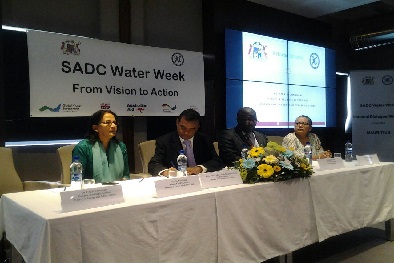The national SADC Water Week under the theme “From Vision to Action” was hosted by the Ministry of Energy and Public Utilities, and facilitated by the Global Water Partnership Southern Africa office on behalf of SADC. Two parallel sessions comprising a media training and a youth forum were held on 3 June. The aim was to sensitise journalists to report on water issues as well as empower the youths to participate in water programmes and development through media and youth workshops respectively.
The main workshop focused in mapping the strategic direction of the fourth phase of the Regional Water Programme known as the Regional Strategic and Action Plan (RSAP IV) on Integrated Water Resources Management and Development.
In his opening address, Mr Collendavelloo recalled that the SADC National Water Weeks, which had already been organised in more than 10 Member States, aim to demonstrate to Member States the value of their cooperation under the SADC umbrella by clearly articulating the benefits enjoyed by each of them in the three phases of the regional water programme since 1999. He added that the Water Weeks serve as a vehicle to advocate for increased investment in water resources development and management, whose ultimate aim is to attain development for improved water security and climate resilience.
Speaking about water issues in Mauritius, the Minister of Energy and Public Utilities said that it is high on Government’s agenda. Mr Collendavalloo reemphasised that Mauritius does not lack water resources, nor is the country affected by chronic droughts. He added that the main challenge is water management - with vision, courage and audacity. According to him, too much water is being wasted. He noted that “There is a dearth of decision makers at the top level. There are more administrators than real managers. Our water problem is more about water management rather than the lack of water resources.”
Mr Collendavalloo spoke about the restructuring of the Central Water Authority (CWA). To that end, a project competition would be launched at the level of the CWA where each staff would give its views and opinions on how to restructure the institution.
A mention of challenges facing island states, such as tropical storms and cyclones was also mentioned in his opening remarks. Regarding such challenges, Mr Collendavallo further emphasized on the need for SADC to consider island state water challenges when developing the new strategy.
Throughout the discussions during the consultation and group work sessions, it is evident that Mauritius is blessed with resourceful aquifers and abundant fresh underground water. The discussions however highlighted that Mauritius, like many other countries is water-stressed. It was noted that the island is moving further into the water-scarce zone with continued population growth, where water availability will be a limiting factor to our socio-economic development. Challenges pointed to increasing water demand due to demographic changes is putting stress on existing water resources and we have not kept pace with the changes in distribution patterns; greater need for Water Infrastructure (storage capacity); impacts of climate change. The islands are subject to tropical storms or cyclones with heavy rainfall from November to May giving rise to periodic flooding. Despite the relative abundance of rainfall, the island also experiences periods of water shortage.
Additional challenges pointed to impacts from land-use activities, urbanisation (increasing demands), high level of no Revenue Water, institutions working in isolation, and fragmented Legislation. Additionally, there are large variations in rainfall and this has implications for available freshwater resources. The island further experiences extended dry seasons with periods of heavy rain, torrential at times, which present technical problems for storage, treatment and distribution. In December, water supply in several parts of the country is severely disrupted because rainfall is deficient.
Significantly, discussions pointed to opportunities that the country can further embark on to manage its water resources. Examples are the need for Government to further bring about a decrease in water demand from the CWA by introducing more rational water tariffs that would force consumers to minimize wastage of the commodity and by encouraging more Mauritians to resort to rain water harvesting. It was also felt that issues of increasing storage capacity of water and implementing water demand management needed to be optimized. During the recent-past, there has been massive investment to revamp the water sector in Mauritius by the government and efforts made at dealing with floods and cyclones, and the role of the private sector in financing water projects and infrastructure is increasing.
Speaking at the end of the workshop, Dr. Msibi (SADC) noted that the experiences and lessons learnt by Mauritius were valuable for other SADC states. These lessons in handling floods, and providing access to drinking water were seen as pivotal to the improvement of the Regional Water Programme in SADC.
